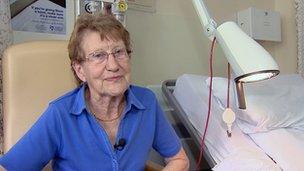Hip op technique at Borders General Hospital cuts hospital stays
- Published
Patients used to have one of the longest stays in Scotland after hip operations in the Borders
People having hip or knee replacements at Borders General Hospital (BGH) can now expect to be up and walking on the same day as their operation.
It is thanks to a new process which has cut the length of time patients need to stay in hospital.
BGH has gone from having one of the longest stays to one of the shortest.
People undergoing hip and knee replacements can go home as early as the day after their operation rather than a week later.
"I had the operation Wednesday and got up on Thursday morning onto a Zimmer," said Pat Mackenzie, who has just had a knee replacement.
"I walked up and down the ward on a Zimmer and then I was transferred onto sticks.
"I've done the stairs with sticks, and that's all that's required for going home."
Using different forms of pain relief helps to ensure patients are pain-free.
"We use preoperative drugs but other than that we put local anaesthetics into the hip or knee, depending on what we're doing," said consultant orthopaedic surgeon Ali Mehdi.
"For the knee we have a special pump which infuses the local anaesthetic fluid for up to 24 hours and that's what makes people walk on the day of surgery."
The technique, which was pioneered in Scotland by the Golden Jubilee hospital in Clydebank, reduces the need for blood transfusions and urinary catheterisations.
Getting people up on their feet quickly also has benefits.
"It leads to less complications such as deep vein thrombosis or pulmonary embolisms," said arthroplasty practitioner Damian Sommerville.
"There's early discharge.
"Patients are more satisfied and it generally makes for better outcomes for everybody concerned."
Patients are also sent to "hip and knee school" before admission, so that they are fit and ready for the operation and they know what's required of them during their recovery afterwards.
"The rest of it is up to me," said Mrs Mackenzie.

Pat Mackenzie is among the patients to have benefited from the new approach in the Borders
"I've got to do the exercises at home - very concentrated hard exercises, I might say!"
Mary Upton is looking forward to being able to play golf again after her hip replacement, for the first time in a year.
"It's been amazing - that's all I can say," she said.
"It's an amazing place."
The Enhanced Recovery Programme has been so successful that the principles are now going to be applied to other groups, such as people with hip fractures.
"It's an example of how, when doctors, nurses, occupational therapists, physios, theatre staff, all work together with the organisation you can get things done fairly quickly," added Mr Mehdi.
- Published27 May 2013
- Published20 February 2013
- Published7 January 2013